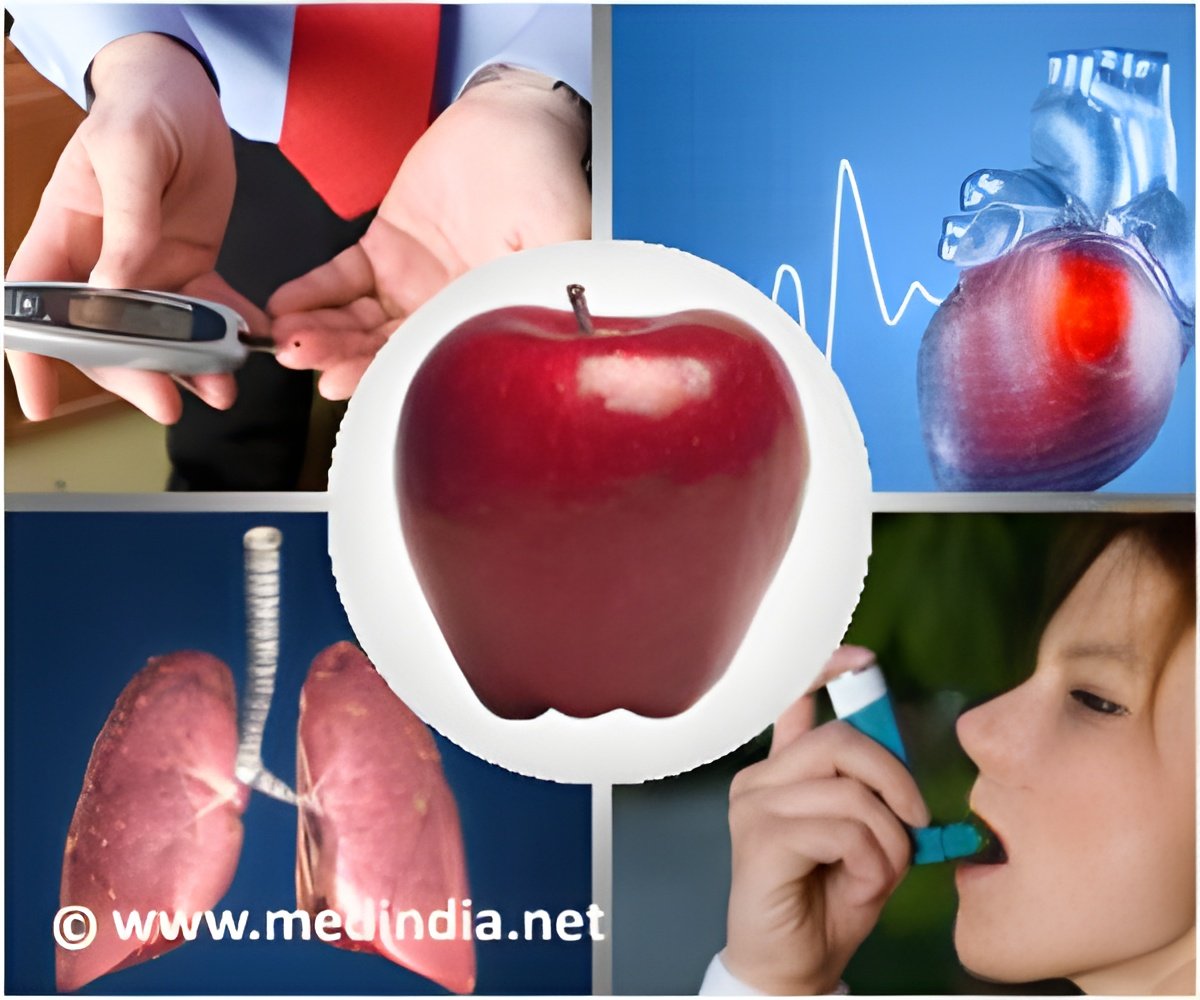Apples, through their high phytochemical content, have a beneficial effect on cancer, heart disease and lung function. They possess antioxidant, cholesterol lowering and antiproliferative properties.

Researchers have found that a diet rich in fruits and vegetables can reduce the incidence of breast cancer, heart disease and other ailments like cataract, diabetes, Alzheimer’s disease and asthma. The beneficial effects of fruits and vegetables have been attributed to phytochemicals. These are non-nutrient components of food and include carotenoids, flavonoids, isoflavonoids, and phenolic acids. Phytochemicals provide a number of health benefits. These include inhibition of proliferation of cancer cells, reduction of inflammation and prevention of oxidation and subsequent damage to DNA, lipids and protein components of cells. The National Research Council recommends consuming five or more servings of fruits and vegetables a day.
Various studies concluded that apples have the following health benefits:
• Apple consumption has been associated with a reduced risk of cancer, especially lung cancer. This appears to be the effect of flavonoids in apples. In contrast, flavonoids from tea were not found to be protective against lung cancer.
• Apple intake was found to reduce the risk of heart disease, which may be associated with the presence of the flavonoids, catechin and epicatechin in apples. Intake of broccoli was also found to have a similar effect on the heart.
• Apples were also found to reduce the risk for diabetes. In this case, quercetin, which is present in apple peels, appears to play an important role. Apples may also contribute to weight loss.
• Apples, especially apple peels, have good antioxidant properties and can protect the consumer from liver and colon cancer.
• The antioxidant properties of apples (due to the presence of phenolics) also protect against lipid oxidation. Lipid oxidation contributes to thickening of blood vessels, a condition called atherosclerosis. Apple peels were found to be most effective in preventing LDL oxidation, followed by apple flesh. Apple juices showed a variable amount of inhibition, depending on the brand.
• Apples have antiproliferative properties i.e. they prevent the proliferation of cancer cells. This property helps to protect against liver and colon cancer. Here again, the peel may possess the major portion of the antiproliferative properties.
• Apples have cholesterol-lowering properties. They also raise the levels of HDL or good cholesterol.
• In addition, apples have also been found to inhibit the activity of cholera toxin, thus providing a beneficial effect in cholera.
Apples are very rich in phytochemicals such as flavonoids and phenolic compounds. The apple peels are rich in compounds like procyanidins, catechin, epicatechin, chlorogenic acid, phlorizin, and the quercetin conjugates. The apple flesh contains catechin, procyanidin, epicatechin, and phlorizin, though in much lesser quantities as compared to the peels (The only exception is chlorogenic acid which is more in the flesh than in the peels.). Quercetin conjugates are only found in the peels.
Though apples contain a high concentration of phytochemicals, in order to have a beneficial effect, it is also important for these substances to be absorbed from the digestive tract. Unfortunately, limited studies have been conducted to test this aspect.
The phytochemical content of apples varies according to the variety of the apples. Fortunately, the phytochemical content is minimally affected by storage. However, it is affected by method of processing of apples into juices. For example, apple juice obtained by pulping and straight pressing has higher antioxidant activity compared to that obtained after pulp enzyming. Apple pomace, the waste product accumulated from juice production, is rich in antioxidants and may be explored for further commercial use. Same is the case with apple peels, which are wasted during the production of apple sauce and canned apples.
So, do not forget to include apples in your next grocery list! And make sure the peels do not end up in the bin!
Reference:
1. Apple phytochemicals and their health benefits; Jeanelle et al; BMC Nutrition Journal 2011
Source-Medindia
 MEDINDIA
MEDINDIA


 Email
Email










